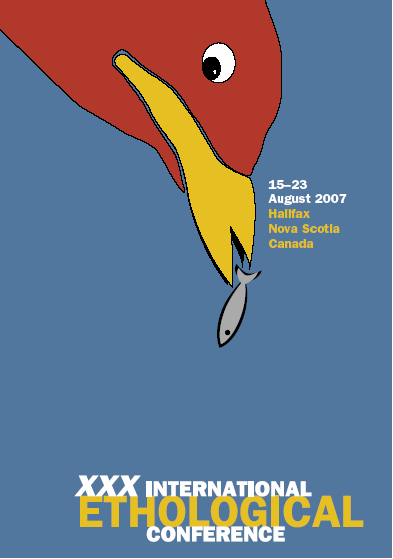

The XXXth International Ethological Conference will be held in Halifax, Nova Scotia, Canada from 15-23 August 2007. The web page for the conference is http://iec2007.psychology.dal.ca/ . I attended the conference in August of 2005 in Budapest, Hungary and it was quite good. In 2007, there appears to be a number of Plenary talks that are directly applicable to at least aspects of Evolutionary Psychology. I'm tentatively planning to go. It is quite a large, international meeting with people from many countries attending.
The list of Plenary Speaker to date are as follows:
CURRENT LIST OF PLENARY SPEAKERS:
Opening Public lecture
Hal Whitehead, Dalhousie University, Canada.
"Adventures of a marine mammalogist in the study of whale language
and culture"
Plenary lectures (tentative titles)
1. Patrick Bateson, Department of Zoology, University of Cambridge,
England
"Developmental Plasticity and Epigenetics"
.
2. Pat Monaghan, University of Glasgow, Scotland.
"Growth, lifespan and life history trade-offs"
3. Elisabetta Visalberghi, Istituto di Scienze e Tecnologie della
Cognizione, Rome, Italy
"Behavioral, cognitive and ecological factors affecting tool use in
wild capuchin monkeys"
4. Atsushi Iriki, RIKEN Brain Science Institute, Japan.
"Brain mechanism for development and evolution of monkey tool-use as
a latent precursor of human intelligence"
5. Roger T. Hanlon, Marine Biological Laboratory, Woods Hole, USA
"Masters of optical illusion: the neuroethology of rapid adaptive
camouflage and communication in cephalopods"
6. Horst Bleckmann, Institut für Zoologie der Universität Bonn, Germany.
"Neuroethology of Sensory Systems"
7. Rui Oliveira, Instituto Superior de Psicologia Aplicada, Lisboa,
Portugal
"From hormones to behaviour and back: androgens, social context and
competition".
8. Hanna Kokko, University of Helsinki, Finland
"Love and hatred in a world of feedback"
9. Sara J. Shettleworth, University of Toronto, Canada
"How do animals know what they know?"
10. Marian Stamp Dawkins, Department of Zoology, University of
Oxford, England
"The scientific basis for assessing suffering in animals"
11. Robert L. Trivers, Department of Anthropology, Rutgers
University,USA
"Human Ethology / Genes in conflict: The Biology of Selfish Genetic
Elements"
Regards,
Jay R. Feierman
2. Pat Monaghan, University of Glasgow, Scotland.
"Growth, lifespan and life history trade-offs"
3. Elisabetta Visalberghi, Istituto di Scienze e Tecnologie della
Cognizione, Rome, Italy
"Behavioral, cognitive and ecological factors affecting tool use in
wild capuchin monkeys"
4. Atsushi Iriki, RIKEN Brain Science Institute, Japan.
"Brain mechanism for development and evolution of monkey tool-use as
a latent precursor of human intelligence"
5. Roger T. Hanlon, Marine Biological Laboratory, Woods Hole, USA
"Masters of optical illusion: the neuroethology of rapid adaptive
camouflage and communication in cephalopods"
6. Horst Bleckmann, Institut für Zoologie der Universität Bonn, Germany.
"Neuroethology of Sensory Systems"
7. Rui Oliveira, Instituto Superior de Psicologia Aplicada, Lisboa,
Portugal
"From hormones to behaviour and back: androgens, social context and
competition".
8. Hanna Kokko, University of Helsinki, Finland
"Love and hatred in a world of feedback"
9. Sara J. Shettleworth, University of Toronto, Canada
"How do animals know what they know?"
10. Marian Stamp Dawkins, Department of Zoology, University of
Oxford, England
"The scientific basis for assessing suffering in animals"
11. Robert L. Trivers, Department of Anthropology, Rutgers
University,USA
"Human Ethology / Genes in conflict: The Biology of Selfish Genetic
Elements"
Regards,
Jay R. Feierman

No hay comentarios:
Publicar un comentario